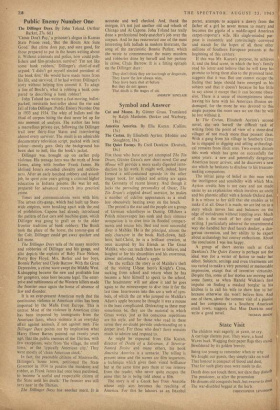Public Enemy Number One
The Dillinger Days. By John Toland. (Arthur Barker, 27s. 6d.) 'CRIME Don't Pay,' a prisoner's slogan in Kansas State Prison read„ 'But the Hours Are Sure Good.' But crime does pay, and sure good, for those prepared to put in the hours writing about it. Without criminals and police, how could pub-. lishers and film-producers survive? `I'm not like some bank robbers,' Dillinger's chief-of-staff argued, 'I didn't get ,myself elected president of the bank first.' He would have made more from his life, and survived, if he had written Dillinger's story without helping him commit it. To adapt a line of Brecht's, what is robbing a bank com- pared to describing a bank robber?
John Toland has written a fast-moving, bullet- packed, inevitable best-seller about the rise and fall of John Dillinger, Public Enemy Number One in 1933 and 1934. The whiz of bullets and the thud of corpses biting the dust never let up for one moment of analysis. The author has been a marvellous private eye, following the Dillinger trail over thirty-four States and interviewing almost every survivor. The result is an admirable documentary television script, packed with local colour—mostly gore. Only the background has been shot to hell, like the book's jacket.
Dillinger was brought up on earlier pulp violence. His teenage hero was the myth of Jesse James, along with brother Frank James. He idolised Jesse's so-called chivalry and reckless- ness. After an early botched robbery and assault
job, he spent ins years getting a criminal higher education in Indiana prisons. He was let out, prepared for advanced research into practical crime.
Times and communications were with him. The urban city-gangs, which had built up State- wide empires, were breaking apart with the end of prohibition. Capone had already introduced the pattern of fast cars and machine-guns, which Dillinger was going to graft on to the older frontier tradition of bank robbery. The Buick took the place of the horse, .the tommy-gun of the Colt. Dillinger could get away quicker and kill more.
The Dillinger Days tells of the many murders and robberies of Dillinger and his gangs, and also depicts the exploits of Baby Face Nelson, Pretty Boy Floyd, Mrs. Barker and her boys, Bonnie Parker and Clyde Barrow. With the Great Depression, a crime wave swept the Middle West. Kidnapping became the new and profitable line for gangsters, once beer became legal. The enter- prise and ruthlessness of the Western killers made the frontier once again the home of absence of law and disorder.
It is an ever-present American myth that the continuous violence in American cities has been imported by the Mafia from Europe. This is untrue. Most of the violence in American cities has been imported by immigrants from the American farm, where violence is an everyday affair against animals, if not against men. The Dillinger Days points out by implication what Harry Elmer Barnes pointed out twenty years ago, that the public enemies of the Thirties, with few exceptions, were from `the village, the small town,' or the 'typically American city.' They were mostly of `clean American stock.'
In fact, the peaceable citizens of Mooresville, Dillinger's home town, petitioned the State Governor in 1934 to pardon the murderer, and robber, as Frank James had once been pardoned, to become 'a useful and respectable citizen of the State until his death.' The frontier was still very near in. the Thirties.
The Dillinger Days has another merit. It is accurate and well checked. And, thank the morgue, it's not just another old sad rehash of Chicago and Al Capone. John Toland has really done a professional body-snatcher's job over the corpses: And he has resurrected one of the most interesting folk ballads in modern literature, the song of • the narcissistic Bonnie Parker; which she wrote to commemorate the many murders and robberies done by herself and her partner in crime, Clyde Barrow. It is a fitting epitaph on the Dillinger days: They don't think they are too tough or desperate, They know the law always wins, They have been shot at before But they do not ignore That death is the wages of sin.
ANDREW SINCLAIR






























 Previous page
Previous page